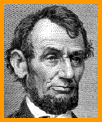ABRAHAM LINCOLN:
(16th President; 1861-65)
Abraham Lincoln (February 12, 1809 - April 15, 1865) was the 16th President of the United States of America. He served as President from March 4, 1861, until April 15, 1865 (he was re-elected in 1864). Lincoln's Vice-President was Andrew Johnson (1808-1875).
Abraham Lincoln was born in a log cabin near Hodgenville, Kentucky. He had very little formal schooling and was mostly self-educated. He eventually became a lawyer and a Republican politician; he earned the nickname "Honest Abe." Lincoln married Mary Todd in 1842; they had four sons, but only one (Robert) survived childhood.
Lincoln was elected President in 1860. During Lincoln's presidency, the Southern states seceded from (left) the Union because Lincoln and the Northern states were against slavery. Six weeks after becoming President, the Civil War began. In this war, the Northern states (which stayed in the Union) fought the Southern states (called the Confederacy). The Civil War lasted from 1861 until 1865.
On Jan. 1, 1863, Lincoln issued the Emancipation Proclamation, which eventually led to the freeing of all slaves in the USA. During the Civil War, Lincoln gave many speeches, including the Gettysburg Address (Nov. 1863), a short speech in which he stated how a country must be dedicated to human freedom in order to survive.
Lincoln was re-elected President in 1864 (defeating Democrat George B. McClellan).
General Robert E. Lee (from the Confederacy) surrendered to General Ulysses S. Grant (from the Union) on April 9, 1865, effectively ending the Civil War.
President Lincoln was shot on April 14, 1865, by John Wilkes Booth (an actor). Lincoln had been attending a play at Ford's Theater in Washington, D.C. Lincoln died the next morning. He was the first US president ever assassinated. Andrew Johnson (Lincoln's Vice-President) became the next US President.
Abraham Lincoln Lesson Plans and Activities By...
ANDREW JOHNSON:
(17th President; 1865-69)
Andrew Johnson (1808-1875) was the 17th president of the United States. Johnson was born on December 29, 1808, in Raleigh, North Carolina. He was Abraham Lincoln's vice-president, and became president after Lincoln was assassinated in 1865. Johnson was the only US president who never went to school; he was self-taught. During the Civil War, Andrew Johnson was the only Southern senator who remained loyal to the Union. During his presidency, Johnson authorized the purchase of Alaska from Russia. Johnson died on July 31, 1875, at Carter Station, Tennessee.
ULYSSES S. GRANT:
(18th President; 1869-77)
Ulysses S. Grant (1822-1885) was the 18th president of the United States. Grant was born on April 22, 1822 in Port Pleasant, Ohio. He was a popular commander of the Union Army in the Civil War. The transcontinental railroad (the east-west railroad across the USA) was completed during Grant's term. Grant's two terms (1869-1877) were littered with scandals that involved some of the under-qualified people that Grant had put in high offices; Grant declined to run for a third term. Grant died on July 23, 1885, in Mount McGregor, New York.
RUTHERFORD B. HAYES:
(19th President; 1877-81)
Rutherford Hayes (1822-1893) was the 19th president of the United States. Hayes was born on October 4, 1822, in Delaware, Ohio. Hayes ended the Reconstruction of the South after the Civil War. During his term as president (1877-1881) the country became more prosperous, but Hayes did not run for a second term. He died on January 17, 1893, in Fremont, Ohio.
JAMES GARFIELD:
(20th President; 1881)
James Garfield (1831-1881) was the 20th president of the United States. Garfield was born on November 19, 1831 in Orange, Ohio. In 1881, four months after becoming president, Garfield was shot and fatally wounded by a person who had wanted, but was not given, a government job by Garfield. Garfield died on September 19, 1881, in Elberon, New Jersey.
CHESTER A. ARTHUR:
(21st President; 1881-85)
Chester Arthur (Oct. 5, 1829-Nov. 18, 1886) was the 21st President of the USA (serving from 1881-1885). Before he was President, Arthur had been the Vice-President of the USA, serving under President James A. Garfield. After Garfield was assassinated, Arthur was elected President. During his term as President, tried to reform the civil service system. Early in his career, Arthur worked as a lawyer and as the customs collector for the Port of New York City (but Arthur was ousted from that office for doing political favors for his party supporters).
CLARA BARTON:
ULYSSES S. GRANT:
(18th President; 1869-77)
Ulysses S. Grant (1822-1885) was the 18th president of the United States. Grant was born on April 22, 1822 in Port Pleasant, Ohio. He was a popular commander of the Union Army in the Civil War. The transcontinental railroad (the east-west railroad across the USA) was completed during Grant's term. Grant's two terms (1869-1877) were littered with scandals that involved some of the under-qualified people that Grant had put in high offices; Grant declined to run for a third term. Grant died on July 23, 1885, in Mount McGregor, New York.
RUTHERFORD B. HAYES:
(19th President; 1877-81)
Rutherford Hayes (1822-1893) was the 19th president of the United States. Hayes was born on October 4, 1822, in Delaware, Ohio. Hayes ended the Reconstruction of the South after the Civil War. During his term as president (1877-1881) the country became more prosperous, but Hayes did not run for a second term. He died on January 17, 1893, in Fremont, Ohio.
JAMES GARFIELD:
(20th President; 1881)
James Garfield (1831-1881) was the 20th president of the United States. Garfield was born on November 19, 1831 in Orange, Ohio. In 1881, four months after becoming president, Garfield was shot and fatally wounded by a person who had wanted, but was not given, a government job by Garfield. Garfield died on September 19, 1881, in Elberon, New Jersey.
CHESTER A. ARTHUR:
(21st President; 1881-85)
Chester Arthur (Oct. 5, 1829-Nov. 18, 1886) was the 21st President of the USA (serving from 1881-1885). Before he was President, Arthur had been the Vice-President of the USA, serving under President James A. Garfield. After Garfield was assassinated, Arthur was elected President. During his term as President, tried to reform the civil service system. Early in his career, Arthur worked as a lawyer and as the customs collector for the Port of New York City (but Arthur was ousted from that office for doing political favors for his party supporters).
CLARA BARTON:
THE PROCESS OF IMPEACHMENT:
BATTLE AT LITTLE BIGHORN:
Awesome Stories about the Battle at Little Bighorn (warning: some graphic video, may not be appropriate for young audiences)








































